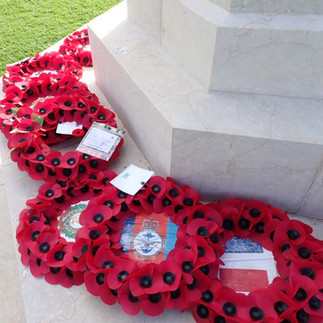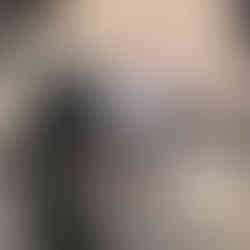Today it was up over the mountains to Chania. The road is good and actually has guardrails, but it still invokes some vertigo. Forty-five minutes into the drive, I realize I’m passing the plain at the r of my Imbros gorge hike. Either way to go, there is no shortcut to here!
The goal is to hit the major sites mentioned in “The fall of Crete,” which details the major battles on the island in May 1941. My first stop was technically in Souda at the Allied war cemetery.
The cemetery is situated near the beach and well done. There is a registry of all buried there and a guest book. Many people, particularly from New Zealand comment. The Māoris from New Zealand were fierce fighters and devastated German troops the first two days of the battle. I was surprised at how many unidentified soldiers there were. Around the central cross were wreaths of red poppies in remembrance of each fighting unit, including one from Qantas airlines for the New Zealanders.
From there, i went to Galatas. This small village was on a hill over looking the Chania harbor. It was the last stand for the Allies before they retreated across the mountain pass I had just driven, so they could get picked up at Hora Sfakion where I was a few days ago. Sadly, there is only a small marker in the town square there.
Moving further west, I arrived at the cemetery for German soldiers who died during the battle. That is after bus driver made me back up a quarter of a mile so she could pass on the narrow road. Dicey! This is also the former battle site called Hill 107, which was another position the Allies held at great cost of lives and then retreated.
There is an interpretive center here and some artifacts. It is very much focused on showing that the Germans were unnecessarily harsh in their treatment of both the Allied soldiers and the Cretan non-combatants. However, there are still a couple of German commanders buried here who are considered war criminals. If I had found them, I would have spit on them. Because for instance, General Brauer ordered several mass executions of civilians.
A German soldier tried to talk one of his commanders out of killing Cretans by fire squad, but the commander did not back down on Rommel’s orders. The soldier said his superior appeared very pale after the killings. The soldier also took photos, which were confiscated from him, but he had sent negatives to Athens for safe keeping. So the images survived.
Also, there were accounts of the battle I could listen to—one by a New Zealander and one by a German. Both of the men lived closed to 100 and at some point, had recorded in detail what happened.
To counter balance the heaviness of the day, I drove inland a bit to a reservoir where there was a walking path and supposedly migratory birds. The path was short, but nice. Unfortunately, there weren’t too many birds. A few egrets, some coots, and some domestic geese with attitude.
From there is was time to get on the road back to my homebase—up and over yhe mountain range again! On the plateau there is a village Askifou, where there is a WWII museum in someone’s home basically.
It was started by George Hatzifakis, who was ten when the Germans attacked his village and dropped a grenade on his home which I hired him and killed his younger sister. After the war, he mad it his life’s mission to collect as many artifacts as he could and try to convey the futility of armed conflict. He died in 2007; his son and granddaughter carry on.
I followed the signs to the home, parked, and went up some sketchy stairs and found the outdoor exhibits. As I was examining them, a motion detector was click clicking. Then I heard tons of locks moving behind old wooden double doors. I waited unsure of who would emerge.
It was the grand daughter and she gave me the tour. There are many guns still with bullets, German propaganda magazines, a Nazi flag, Alloed uniforms, mess kits, binochulars, and more. There is even a rusty British telescope that still works. A true time capsule.
As I was descending the mountain, a glorious sunset greeted me, and I had to pull off and watch for awhile. And I was not the only one who was.
I grabbed dinner at the local restaurant and the owner was quite pleased that I was making an effort with my Greek and ordered Leuko krasi—white wine. Off to bed then as I needed my sleep before a long drive Saturday.
















































Comments